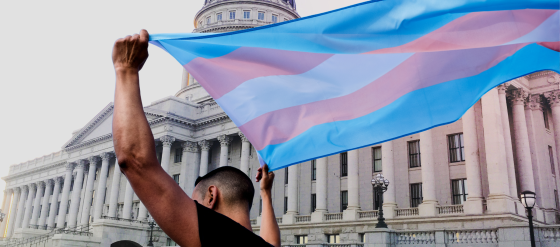Free Expression, Religion and Belief - In April 1999, the Salt Lake City Council voted 5-2 to sell the downtown block of Main Street between North and South Temple to the Church of Jesus Christ of Latter-day Saints. Unbeknownst to city residents, it also sold the public’s First Amendment rights, immediately transforming the block into a space in which the LDS Church was granted the absolute and exclusive right to broadcast its own messages and, at the same time, ban all other viewpoints.
The Salt Lake City Planning Commission approved the transaction with the condition that the space be regulated like a public park. However, the final documents included a public easement in which the city gave the LDS Church unbridled discretion to prohibit, among other things, “loitering, assembling, … demonstrating, picketing, distributing literature, … erecting signs or displays, using loudspeakers or other devices to project music, sound or spoken messages, engaging in any … offensive, indecent, … lewd or disorderly speech, dress or conduct …” on Main Street. Importantly, these prohibitions applied only to members of the public. Under the conditions of the sale, the LDS Church could make exclusive use of the property for expressive purposes, “including, without limitation, the distribution of literature, the erection of signs and displays by [the LDS Church], and the projection of music and spoken messages by [the LDS Church]." Such one-sided restrictions violate both the free speech and the Establishment Clause of the First Amendment.
Also, by granting the LDS Church absolute control over the views expressed and the nature of the conduct permitted on the property, the city delegated some of its governmental powers to a church. After all, it would be church security and not the Salt Lake City Police Department who would determine when a visitor had violated the terms of the easement and impose punishment for that violation. Even if an easement were drafted with conditions consistent with a traditional public forum, the First Amendment’s demand for the strict separation of church and state does not allow the city to grant this traditional state function to a church.
In a lawsuit filed in November 1999 on behalf of the First Unitarian Church, Utahns for Fairness, and the Utah National Organization for Women, the ACLU of Utah argued that because of Main Street’s unique role in Salt Lake City’s history and its ongoing use as a public thoroughfare, it continues to be a public forum. In November 2000, we filed a motion for partial summary judgment.
In January 2001, U.S. District Judge Ted Stewart dismissed all of our claims, concluding that the city’s sale of Main Street and the LDS Church’s transformation of the street into a restricted religious plaza did not violate the plaintiffs’ free speech rights, the establishment clause, or the Fourteenth Amendment’s equal protection clause. On August 13, 2001, we filed an appeal with the Tenth Circuit Court of Appeals in which we asked that body to review the constitutionality of the plaza restrictions. We filed our reply brief on November 9, 2001, and on March 18, 2002, the court heard oral arguments. On October 9, 2002, the Tenth Circuit issued a ruling reversing the district court decision and declaring the Main Street Plaza sidewalks a public forum.
The case officially ended on January 29, 2003 when the District Court issued a Judgment and Permanent Injunction in favor of the plaintiffs. In part, the ruling stated, " ...It is further ORDERED, ADJUDGED AND DECLARED that the pedestrian easement reserved to Salt Lake City Corporation pursuant to the April 27, 1999 Special Warranty Deed is a public forum to which the First Amendment applies; that the restrictions on expressive conduct on the pedestrian easement contained in sections 2.2, 2.3, and 3 of the April 27, 1999 Special Warranty Deed violate the First Amendment of the United States Constitution; and said restriction are therefore invalid." In June 2003, the Salt Lake City Council set in motion a second lawsuit involving the public’s First Amendment rights on the Main Street Plaza when it voted 6-0 to swap the plaza’s public easement for land owned by the LDS Church on the west side of town and funds to create a new community center.
